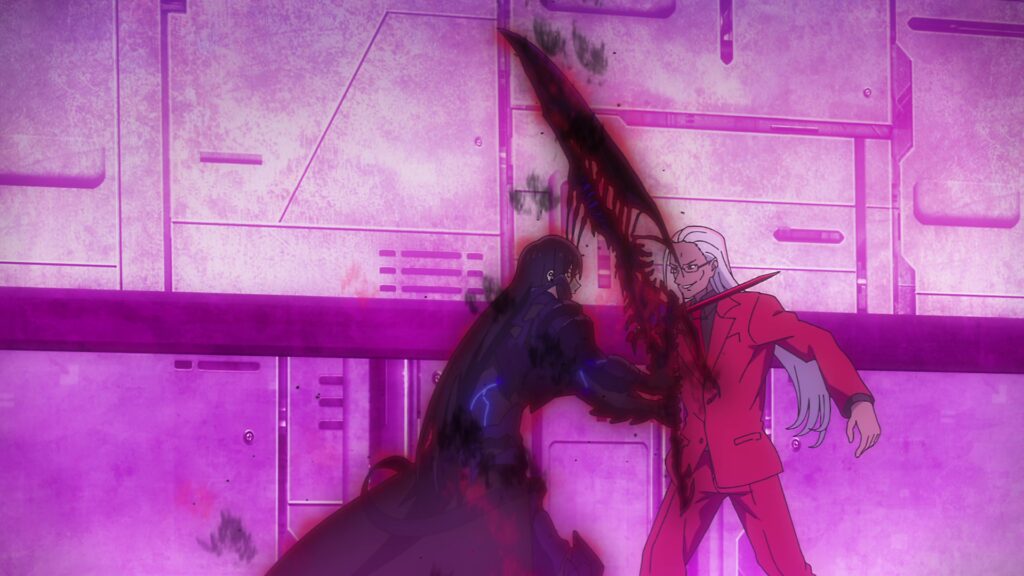
“How’s the pain of life treating you mortals today? It is I, the Demon Lord, Veltol Velvet Velsvalt!”
When I was formulating my list of shows that I’d be watching this season, Maou 2099 was a really late substitution. The only reason it ended up on that list was because other critics repeatedly used the term “Shadowrun-esque” and that’s enough to spark my interest. I love the blending of cyberpunk and high fantasy genres, and there aren’t too many games or anime that scratch that particular itch. In that regard, Maou 2099 arrived at the right moment for me, but I’m not sure I can broadly recommend it, given the lack of proper narrative payoff.
I’m really of two minds on this one. Much of the show is fun and represents an underrepresented subgenre. Unfortunately, it’s also one of the most bafflingly paced shows I’ve seen in a while. Part of me would love to endorse this show, but I suspect you’re better off seeking out either a translation of the light novel or the manga. If, like me, you’re bemoaning the lack of any new Shadowrun video games, Maou 2099 might seem like a nice substitute, but the uneven pacing of this season leaves much to be desired.
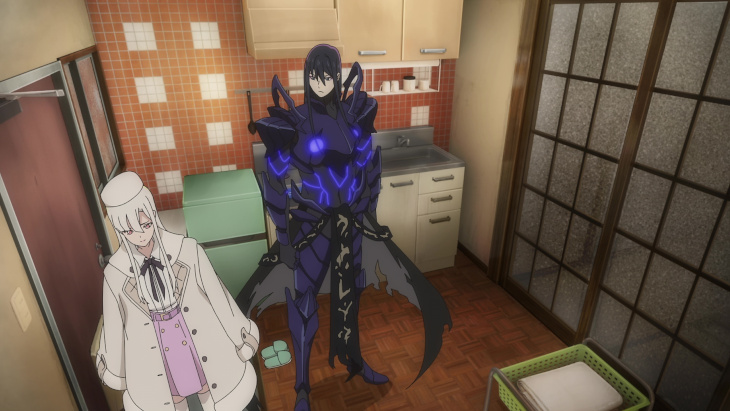
The series is centered on Demon Lord Veltol Velvet Velsvalt (pause for laughter), who was defeated long ago by the hero Gram. As he dies, Veltol informs Gram that he will one day return to restore his empire. True to his word, Veltol eventually reawakens, only to find himself in a dystopian version of Tokyo in the year 2099. While he was gone, his magical world of Alneath had fused with modern Earth in an event referred to as the Awakening Fantasion. Veltol is shocked to learn that only one of his original followers remains loyal to him, and the diminished faith in him has left him weak, with no means of navigating the technological age. Thus, Veltol is forced to find a new way to navigate his surroundings… as a Dark Souls Let’s Player.
I can’t stress how much this premise and plot hinge on Veltol being both likable and capable of avoiding embarrassment. In media, one of the primary flaws of the fish-out-of-water premise is that viewers are forced to watch the protagonist fumble through common everyday scenarios, potentially embarrassing themselves at every turn. When the comedy of those interactions doesn’t land, all you’re left with is the uncomfortable awkwardness of the setup. Fortunately, Demon Lord 2099 has three factors that sidestep those issues. Firstly, Veltol is seemingly immune to embarrassment. He’ll plow forward with utter confidence regardless of the scenario. Second, Veltol isn’t an idiot. He’s quick to grasp scenarios and figure out a method to circumvent obstacles. Finally, since we aren’t dealing with a modern version of Tokyo, most instances where characters have to explain things to Veltol serve as useful exposition for the viewer as well. By balancing these three elements, Demon Lord 2099 succeeds in turning what could have been an irritating component of its premise into a positive.
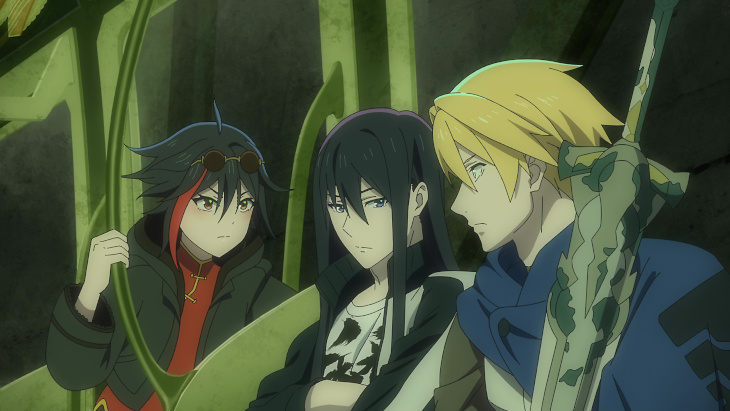
Beyond his bravado and resourcefulness (and his superhuman ability to have Satoshi Hino’s voice), Veltol also relies on the aid of his sole remaining follower Machina. In a way, Machina often serves as the straight man among our leads, though she certainly has her moments to shine, particularly when it comes to her poorly veiled romantic affection for Veltol. The pair also receive aid from the eccentric magical hacker, Takahashi, who assists the pair with the more technical aspects of their exploits.
While I find the trio is a good source of comedy, and I enjoy spending time following them, the plot of the show is a bit shakier. I think with a larger episode count, the twists and turns could have had proper time to breathe. I was startled by how abruptly the primary plot seemed to come to an end midway through the season, and we suddenly swerved into a new plot with episode 8. I’m guessing the anime adapts the first two light novels, but the transition is truncated to say the least. Unfortunately, this is where the show hits its biggest stumbling block. In both of the arcs contained within this season, the third act is a pacing nightmare. It feels like someone shoved two 8 episode arcs into a 12 episode runtime, and it kills investment.
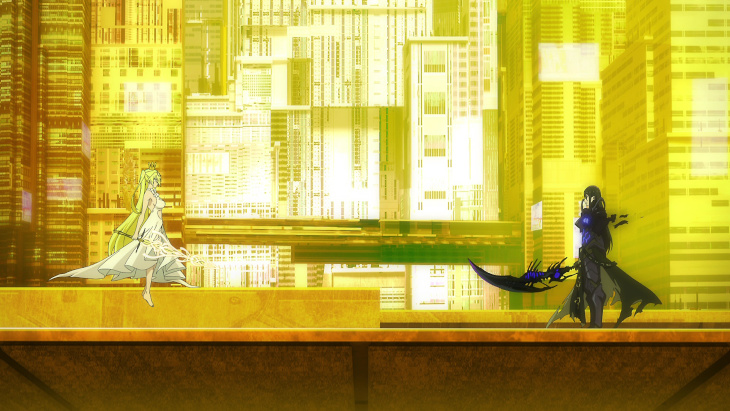
The aesthetic of Demon Lord 2099 is crisp and appealing, even if the animation feels like it’s two steps behind. I feel like I don’t even need to say this is produced by J.C. Staff at this point. It’s implicit from that first sentence. J.C. Staff isn’t the studio you go to for sakuga, it’s the studio you turn to when you want something produced that looks halfway decent on a budget, and I suppose that’s what we got here.
The issue I have with J.C. Staff’s approach to this show, aside from whatever they did to squeeze all this plot into 12 episodes, is the shortcuts they take to try and make the action scenes look cool. During the climatic battles of both arcs, they saturate the backgrounds with a single color. The entire conclusion of the first arc is defined by its neon fuchsia background, and the second arc one-ups it by making the background bright yellow with occasional instances of blood red (I think it’s time to call a urologist). The OP is quite good, and it might be the one element of this show that I’d recommend people check out unconditionally. I suppose I shouldn’t be surprised that the overall quality would match the inconsistency of the narrative delivery.
Before I wrap up, a few Notes and Nitpicks:
- I was trying to decide if I preferred the first or second arc, but both had some major issues holding them back. The first arc is mostly focused on setting up the world and characters, so the plot feels basic and stripped down. The second has better comedy and a few nice twists, but its pace could best be described as exponential. By the time we’re at episode 11, it felt like we’d reached escape velocity, and from there, it’s a mess right to the end.
- For the record, if you’re curious about the Shadowrun RPGs, I highly recommend starting with Dragonfall. While I technically like Hong Kong a bit more, it expands on the game mechanics, so it’s easier to go from Dragonfall to Hong Kong than the other way around. As for Shadowrun Returns, you can probably skip that one unless you’re committed to playing all three. It feels more like a proof of concept than a fully realized game, and is not memorable.
- The show also starts leaning on fan-service more in the second half, though that’s a minor gripe compared to the manic plotting.
- I’ve never actually read any light novels, so if I do pick this up, it’ll be a first for me. I’m not in any rush though. My reading backlog contains over a hundred books (I’m Kora_Redward on StoryGraph), so I’ll just leave this on the back burner for now.
I’ve been debating the score for Demon Lord 2099 for a while. I’ve ultimately landed on the side of being mildly positive, but not affording it a recommendation. Sure, each of its arcs fall apart at the end, but I enjoyed the setting enough that I’m considering checking out the light novel and seeing if it deserved better. If you asked me back when I was on episode 9 or 10, I’d have said I’d probably give this show a mild recommendation, but now that I’m at the finish line, I honestly don’t think I can. It’s a shame when a series shows ample promise, only to fall apart in the final stretch.

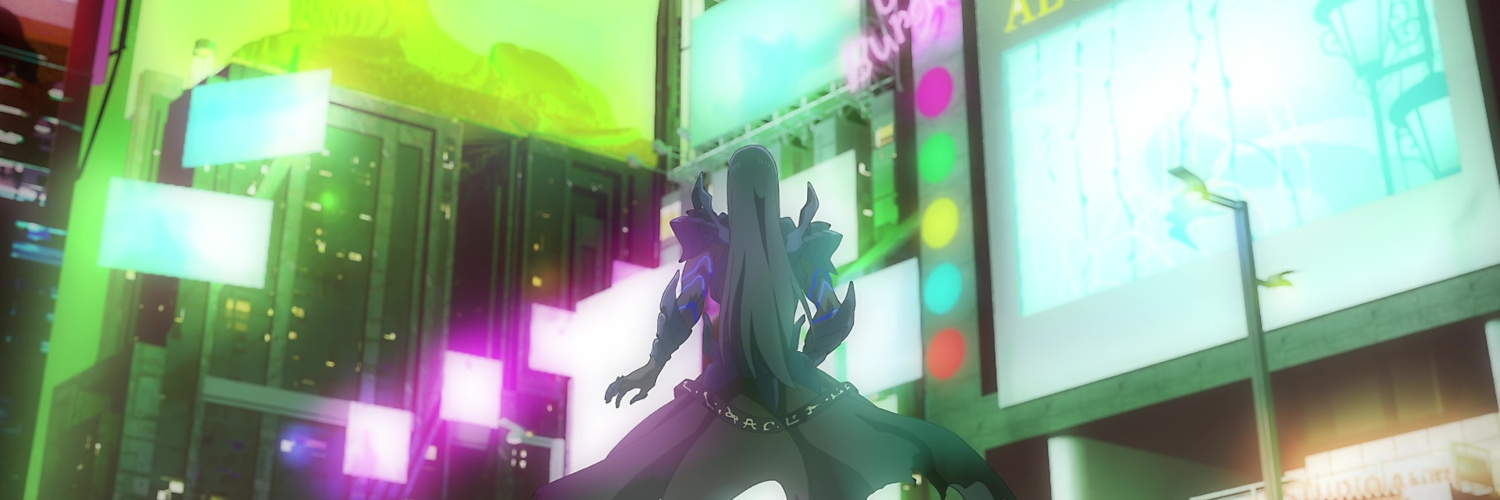
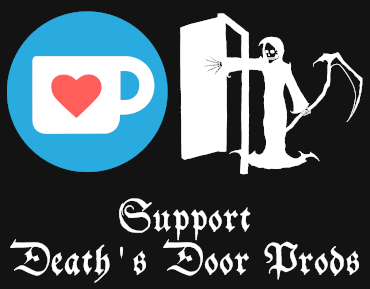


Add comment